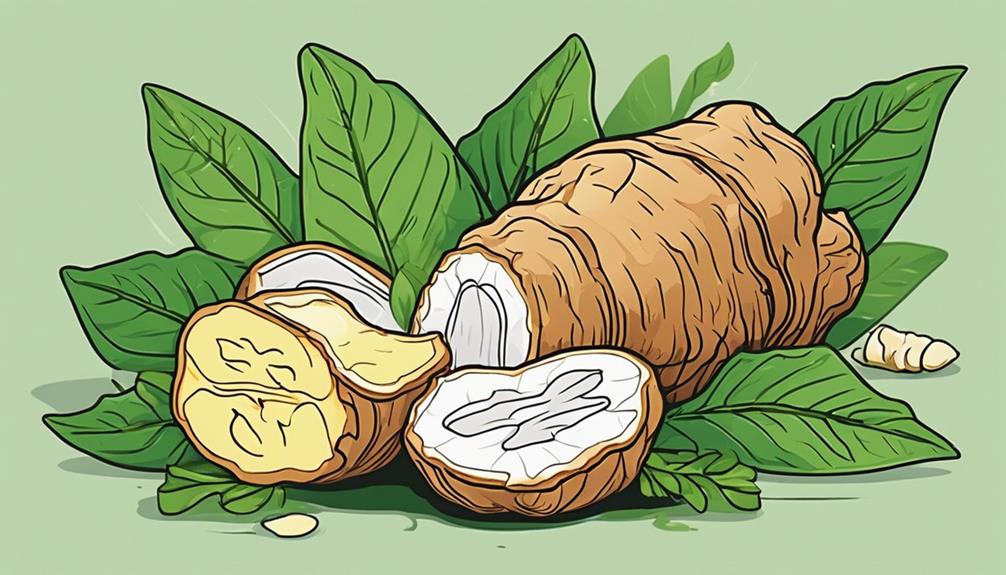When it comes to managing your blood sugar levels, think of herbs as nature's silent guardians. Cinnamon, fenugreek, ginger, and bitter melon are all known for their potential in regulating blood sugar.
But how exactly do these herbal alternatives work their magic within your body? Let's uncover the subtle yet powerful ways in which these plants could be influencing your blood sugar levels, offering you a glimpse into a world where ancient remedies meet modern health challenges.
Key Takeaways
- Cinnamon and fenugreek lower fasting blood sugar levels.
- Ginger and turmeric provide antioxidant and anti-inflammatory effects.
- Bitter melon and fenugreek enhance glucose utilization and insulin function.
- Cinnamon, fenugreek, ginger, and turmeric support overall blood sugar control.
Cinnamon for Blood Sugar Control

To help regulate blood sugar levels, incorporating cinnamon into your diet has shown promising results in various studies. Cinnamon benefits individuals by improving insulin sensitivity, which is crucial for managing blood sugar levels effectively. Studies have indicated that cinnamon may lower fasting blood sugar levels by enhancing insulin sensitivity in your body's cells. This means that your cells can better utilize glucose from your bloodstream, reducing the risk of high blood sugar levels.
Cinnamon contains bioactive compounds that have been found to mimic the effects of insulin and help transport glucose into cells. This action can assist in maintaining stable blood sugar levels throughout the day. By incorporating cinnamon into your meals or beverages, you may experience improved blood sugar control, especially after carbohydrate-rich meals. However, it's essential to remember that while cinnamon can be a helpful addition to your diabetes management plan, it shouldn't replace prescribed medications or a balanced diet. Always consult with your healthcare provider before making significant changes to your diabetes management routine.
Fenugreek for Diabetes Management
Fenugreek seeds have shown potential in aiding diabetes management through their impact on blood sugar regulation. These seeds contain fiber and compounds that may help improve insulin function and reduce blood sugar levels. Research suggests that fenugreek benefits individuals with diabetes by lowering fasting blood sugar levels and improving glucose tolerance.
As herbal supplements, fenugreek seeds can be consumed in various forms, such as capsules, powders, or teas. The recommended dosage for diabetes management is around 2.5 to 15 grams per day. However, it's essential to consult with a healthcare provider before adding fenugreek supplements to your routine, especially if you're taking other medications to avoid any potential interactions.
Incorporating fenugreek into your diet may offer a natural approach to diabetes management, but it shouldn't replace prescribed medications or lifestyle modifications. While fenugreek shows promise in regulating blood sugar levels, individual responses may vary. As with any herbal remedy, consistency and monitoring are key to assessing its effects on your diabetes.
Ginger as a Natural Diabetes Remedy

Ginger, renowned for its culinary uses, holds potential as a natural remedy for managing diabetes. Research suggests that ginger may aid in blood sugar regulation due to its active compounds. Here are four ways ginger can benefit individuals looking to manage diabetes:
- Anti-Inflammatory Properties: Ginger contains gingerol, which has potent anti-inflammatory effects that may help reduce inflammation linked to diabetes complications.
- Improved Insulin Sensitivity: Some studies indicate that ginger may enhance insulin sensitivity, allowing cells to respond better to insulin and regulate blood sugar levels more effectively.
- Antioxidant Effects: The antioxidants in ginger can help combat oxidative stress and protect against cell damage caused by high blood sugar levels in diabetes.
- Ginger Recipes for Blood Sugar Control: Incorporate ginger into your diet by adding it to smoothies, stir-fries, or making ginger tea to enjoy its potential benefits for managing diabetes. Try recipes like ginger-spiced roasted vegetables or ginger-infused water for a flavorful way to support your health.
Bitter Melon for Blood Glucose
Utilizing bitter melon can potentially aid in regulating blood glucose levels due to its active compounds and their effects on insulin sensitivity and glucose metabolism. Bitter melon, also known as bitter gourd or Momordica charantia, is a tropical vine vegetable that has long been used in traditional medicine for its health benefits. The key to bitter melon benefits lies in its bioactive components, such as charantin, polypeptide-p, and vicine, which have shown promising effects in managing blood sugar levels.
Research suggests that bitter melon may help improve glucose regulation by increasing insulin secretion, enhancing peripheral glucose utilization, and inhibiting gluconeogenesis. These actions can contribute to better control of blood sugar levels, making bitter melon a valuable natural remedy for individuals looking to manage their diabetes or prevent insulin resistance.
Incorporating bitter melon into your diet, whether through fresh consumption, cooking, or supplementation, can offer potential advantages in supporting overall glucose metabolism and insulin function. However, it's essential to consult with a healthcare provider before making significant changes to your diabetes management plan.
Turmeric for Blood Sugar Balance

To support blood sugar balance, incorporating turmeric into your diet may offer potential benefits due to its active compound curcumin and its effects on insulin sensitivity and glucose metabolism. Turmeric benefits include its ability to modulate various signaling molecules involved in glucose uptake and utilization, making it a promising herbal alternative for blood sugar regulation.
Here are four ways turmeric can positively impact blood sugar levels:
- Enhanced Insulin Sensitivity: Curcumin in turmeric has been shown to improve insulin sensitivity, which can help regulate blood sugar levels more effectively.
- Reduced Inflammation: Turmeric possesses anti-inflammatory properties that may aid in reducing inflammation linked to insulin resistance and diabetes.
- Antioxidant Effects: The antioxidants in turmeric can help protect pancreatic cells responsible for insulin production, potentially preserving their function.
- Improved Glucose Metabolism: By influencing enzymes involved in glucose metabolism, turmeric may assist in better regulating blood sugar levels over time.
Incorporating turmeric into your diet or using it as a supplement could be a natural way to support your blood sugar balance and overall health.
Frequently Asked Questions
Are There Any Potential Side Effects or Interactions With Medications When Using These Herbal Alternatives for Blood Sugar Regulation?
When using herbal alternatives for blood sugar regulation, potential risks include side effects like digestive issues. Benefits may include improved glucose control. Drug interactions can occur, impacting medication efficacy. Consult a healthcare provider for guidance.
How Should These Herbs Be Consumed – in Their Natural Form, as Supplements, or in Teas and Tinctures?
When considering herbal alternatives for blood sugar regulation, it's essential to understand how these herbs should be consumed. Opt for herbal infusions or tinctures for natural remedies, or capsules for a convenient intake method.
Can These Herbal Alternatives Be Used as a Replacement for Traditional Diabetes Medications, or Should They Be Used in Conjunction With Them?
When considering herbal alternatives for blood sugar regulation, it's crucial to consult with your healthcare provider to determine if they can replace traditional diabetes medications or should be used alongside them for optimal results.
Are There Specific Dosages or Guidelines for Using These Herbs Effectively for Blood Sugar Regulation?
Want to ace the herbal dosage game for blood sugar balance? Follow these usage guidelines like a pro: start slow, track results, adjust as needed. Recommendations vary, so consult with your healthcare provider for personalized advice.
How Long Does It Typically Take to See Results When Using These Herbal Alternatives for Managing Blood Sugar Levels?
When using herbal alternatives for blood sugar regulation, results can vary. Monitoring progress is key. Herbal combinations can take weeks to months for noticeable effects. Managing expectations and understanding herbal benefits help in achieving desired outcomes.
Conclusion
In conclusion, these herbal alternatives offer promising potential for blood sugar regulation. Whether it's the sweet and spicy kick of cinnamon, the earthy flavor of fenugreek, the zing of ginger, the bitterness of bitter melon, or the vibrant hue of turmeric, each herb provides unique benefits for diabetes management.
Incorporating these natural remedies into your diet may help maintain healthy blood glucose levels. So why not give them a try and see the miraculous results for yourself!